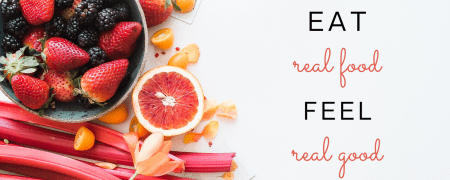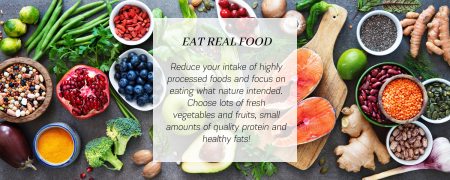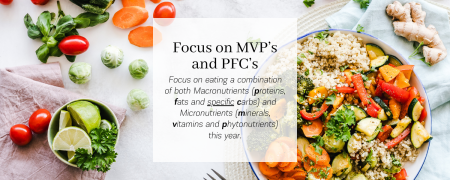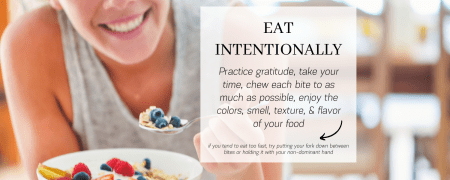
With all the popular diets that emerge each year it’s really difficult to decide which might work best for you. I have spent more than a decade researching ways of eating (diets) and here’s what I found:
The diets that result in the best health outcomes all share one commonality: they all remove highly processed foods and focus on consuming real food – the kind made by nature!
If you want to feel your best, here are some tips I recommend.
And just as a preface, I highly recommend that if you have any digestive related symptoms you address those issues and treat then as your #1 priority. If for any reason your digestive system is not functioning properly, it may result in an inability to breakdown and absorb nutrients. If you are going to put the effort into finding the right diet, be sure you will be able to reap all the benefits!
Ok, here we go:

#1 – If you are looking for the best way to eat, focus on eating more real food and reducing or eliminating as many highly processed foods as possible. Your body will thank you.
Add a variety of new vegetables and fruits to your diet each and every week. TIP: Visit the grocery store when most others don’t (like a Friday night) so that you can browse the produce section without all the stress of a Sunday afternoon grocery store run. This will allow you to explore all the bounty you may be missing out on.
Of all the bacteria that play a role in our health and wellness that reside in our gut, NONE prefer sugar, fat or even protein….they thrive off of plant fibers and the more variety, the happy their community is which means the healthier we are!
 #2 – This might be a tough pill to swallow for some since there are so many convenient options on every corner but, if you can mostly make your own food, you will be well rewarded. Cooking at home has a lot of advantages including knowing every single ingredient you will be consuming and knowing that your food is not combined with countless chemicals. Convenient, fast foods usually use low grade oils that can contribute to inflammation, dyes that our bodies are not capable of breaking down and WAY too much sugar – heck they even put sugar in soup!
#2 – This might be a tough pill to swallow for some since there are so many convenient options on every corner but, if you can mostly make your own food, you will be well rewarded. Cooking at home has a lot of advantages including knowing every single ingredient you will be consuming and knowing that your food is not combined with countless chemicals. Convenient, fast foods usually use low grade oils that can contribute to inflammation, dyes that our bodies are not capable of breaking down and WAY too much sugar – heck they even put sugar in soup!
On top of being clearner to eat, you are also able to get creative and have fun with new ingredients, flavor profiles and recipes when you cook your own food. If this feels hard, simply start by reducing the number of times each week you eat out – Rome wasn’t built in a day!
 #3 – Next, remember these two acronyms and don’t get bogged down with all the heavy details of weighing and measuring food or calorie counting that can feel so overwhelming:
#3 – Next, remember these two acronyms and don’t get bogged down with all the heavy details of weighing and measuring food or calorie counting that can feel so overwhelming:
MVP – Minerals, Vitamins, and Phytonutrients
PFC – Proteins, Fats and (specific) Carbs
Our bodies thrive when given optimal amounts of all those amazing compounds that help provide the right type of energy for us. Check out this Nutrient Guide for the specifics of MVP’s – it is really helpful for choosing foods rich in MVP’s so you don’t have to do the digging online.
As for PFC’s, I recommend focusing on consuming as many different types of vegetables and fruits (these are specific carbs) as possible, having smaller portions of high quality protein and enjoying lots of health fats most of the time. Here is a Macronutrients handout that might be helpful for PFC’s. The most important thing to remember is this: listen to your body when you eat. If you notice any of the following symptoms, remove the offending food. Avoid the food for a few weeks then try it again, in isolation, to see how you feel. If you aren’t sure which food caused the issues, start food journaling.
 #4 – Lastly, digestion works best when we are in a relaxed state so try eating intentionally. This really means to simply slow down, take a few deep breaths prior to eating, relax and clear your mind of all the worries of your day.
#4 – Lastly, digestion works best when we are in a relaxed state so try eating intentionally. This really means to simply slow down, take a few deep breaths prior to eating, relax and clear your mind of all the worries of your day.
I keep a candle on my table (where I eat 95% of the time) and light it just prior to eating. The candle is really what has become a reminder that eating is a time to relax but it also creates a nice mood as well.
To sum it all up, most of us are looking for ways to improve our health and longevity. Diet is but one thing to consider but it’s a big one as our food is how we provide energy to our cells which handle countless, critical operations that keep our bodies running. Instead of buying into the diet culture, use these simple tips to make small changes over time around food and you will see and feel the difference.
Happy eating!